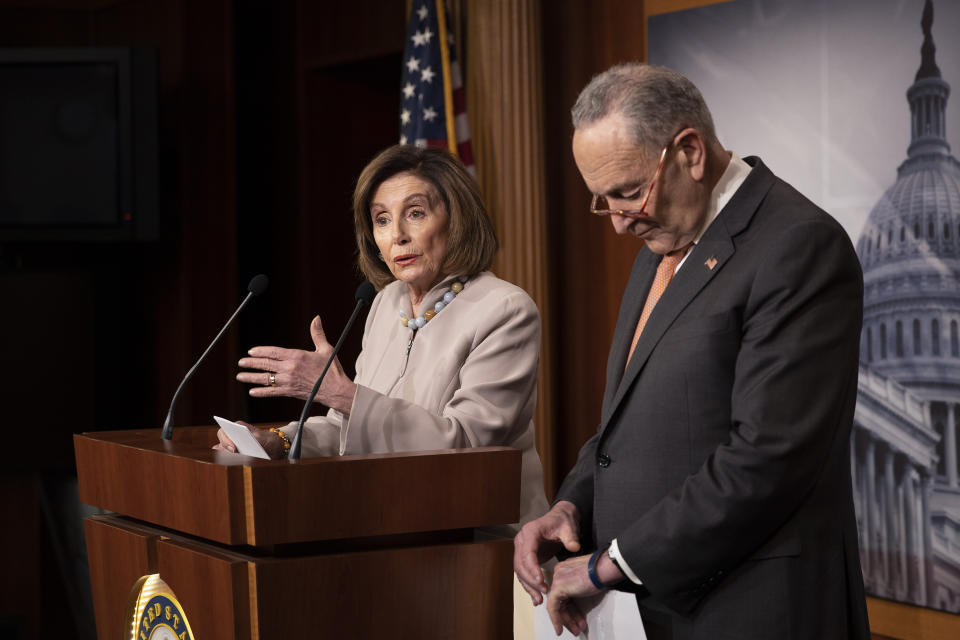Democrats Counter GOP Push On Small Business Relief
WASHINGTON ― Republicans tried to get the jump on Democrats on Tuesday by quickly moving to approve hundreds of billions for a new program designed to prevent layoffs at small businesses. They said the program was already running out of money and needed to be replenished swiftly by Congress as early as Friday.
But on Wednesday, House Speaker Nancy Pelosi (D-Calif.) and Senate Minority Leader Chuck Schumer (D-N.Y.) made clear they would be seeking additional funding for their priorities on top of the $250 billion sought by Republicans for the so-called Paycheck Protection Program.
The program was included in the $2 trillion coronavirus stimulus bill Congress passed less than two weeks ago. Its original $350 billion in funding was meant to offer small businesses forgivable loans of up to $10 million to cover their payrolls for eight weeks. If they don’t lay off their workers or slash their pay, then the loan is forgiven.
The Small Business Administration has said that thousands of loans totaling tens of billions of dollars have already been processed ― but it’s not clear how much actual lending has happened yet. The administration has struggled to get the program running smoothly, and many business owners have had difficulties either applying for or receiving a loan.
Pelosi and Schumer said in a joint statement that they support funneling $250 billion in additional funding to the program so long as half of that amount is channeled through “community-based financial institutions that serve farmers, family, women, minority and veteran-owned small businesses and nonprofits in rural, tribal, suburban and urban communities across our country.”
They also want $100 billion more for hospitals and community health centers, as well as $150 billion more in aid for state and local governments, many of which have run up huge deficits in responding to the crisis.
Finally, Pelosi and Schumer are calling for a 15 percent boost to food benefits for eligible low-income individuals and families as part of any interim deal on additional coronavirus relief. It’s something Congress also did in the 2009 stimulus following the Great Recession.

“The heartbreaking acceleration of the coronavirus crisis demands bold, urgent and ongoing action from Congress to protect Americans’ lives and livelihoods,” they wrote in the joint statement.
The counteroffer sets up a showdown with Senate Majority Leader Mitch McConnell (R-Ky.), who said he was planning on passing the additional relief to small businesses via unanimous consent during a pro forma session of the Senate on Thursday.
While the upper chamber is technically on recess until April 20, most senators are still in Washington and any one of them could block the move.
“Senate Democrats should drop their shameful threat to block this funding immediately. Our small businesses desperately need help – now,” Sen. John Cornyn (R-Texas) said in a statement.
Meanwhile, Sen. Elizabeth Warren (D-Mass.) urged Congress to go even further by eliminating the cap on funding for the Paycheck Protection Program entirely. The senator said it should also provide direct grants to small businesses rather than loans that can later be forgiven.
“Tell people we won’t let PPP run out of money and we will fully fund all applications – immediately & until this crisis ends,” Warren wrote in a tweet on Wednesday.
Democrats say that action bolstering the coronavirus stimulus bill, otherwise known as CARES, with more funds should be only an intermediary step before Congress moves to a bigger, fourth legislative package to address the crisis. They want to see additional measures in the next bill like expanded voting and hazard pay for essential workers. Republicans, meanwhile, have not placed as big of an emphasis on another bill.
“After we pass this interim emergency legislation, Congress will move to pass a CARES 2 Act that will extend and expand the bipartisan CARES Act to meet the needs of the American people,” Pelosi and Schumer said. “CARES 2 must provide transformational relief as the American people weather this assault on their lives and livelihoods.”
A HuffPost Guide To Coronavirus
Stay up to date with our live blog as we cover the COVID-19 pandemic
Everything you need to know about face masks right now
How long are asymptomatic carriers contagious?
What to do if you can’t pay rent now
How to switch off from work when home is your office
8 sleep tips if coronavirus anxiety is keeping you up at night
How long does coronavirus live in the air?
What coronavirus questions are on your mind right now? We want to help you find answers.
Everyone deserves accurate information about COVID-19. Support journalism without a paywall — and keep it free for everyone — by becoming a HuffPost member today.
Love HuffPost? Become a founding member of HuffPost Plus today.
This article originally appeared on HuffPost.


